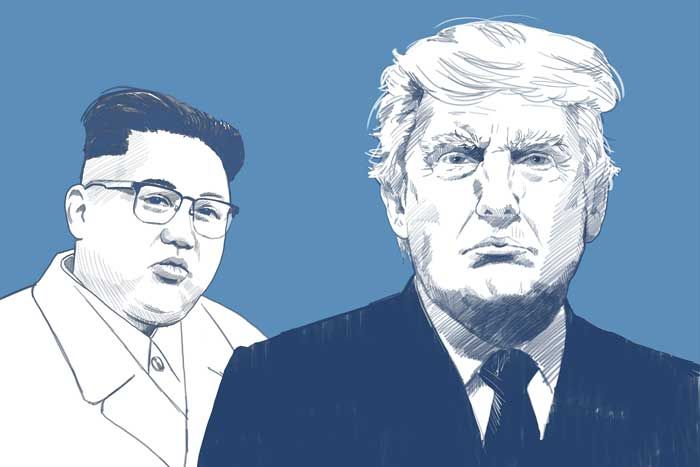Trump cancels Kim summit, confuses world
By Dan Drollette Jr | May 24, 2018

Now has come the news that a lot of us were expecting—but it is one thing to have a general notion, and another to see a headline in black-and-white on the front page of the New York Times titled “Trump pulls out of June summit meeting with North Korea.”
At this point, most news coverage is limited to a brief announcement and reprints of Trump’s letter in full to the leader of North Korea. (An exception is Vox, which ran an article titled “Why did anyone ever take Trump’s North Korea diplomacy seriously?”) It does seem significant, as the Washington Post noted, that Trump cites “ ‘tremendous anger and open hostility’ from the Kim regime” as the reason for cancelling the meeting, which had been scheduled to be held on June 12 in Singapore. It also seems important that the US president apparently blindsided nearly everyone with the news, from what information has trickled out at this point.
For a good analysis of just how complicated the Korean security situation can be, there’s “A comprehensive history of North Korea’s nuclear program,” just published by Siegfried Hecker, Robert Carlin, and Elliot Serbin of the Center for International Security and Cooperation (CISAC) at Stanford University. In exhaustive detail, the 76-page narrative (and accompanying color-coded charts) delves into the past 25 years’ of effort to limit North Korea’s nuclear ambitions. Some of the report’s key takeaways: North Korea’s pursuit of nuclear weapons has been deliberate, determined, and patient; US diplomacy since 2000 has been sporadic, reactive, and often motivated by a desire to avoid instead of manage risk; no one has agreed on what exactly “denuclearization” means; North Korea has NOT “cheated on every agreement;” and as bad as things were in 2017, the situation could get worse.>
Shortly after Trump’s cancellation of the summit was announced, University of Chicago historian and long-time Korea-watcher Bruce Cumings, sent the Bulletin his response, which noted: “It is absurd to cancel the upcoming summit because of entirely predictable North Korean rhetoric, on the very day when they blew up their nuclear test site in front of foreign journalists.” He went on to write that President Trump’s inexperience and impulsive behavior appear to have led him to dictate a letter canceling the summit, “apparently without time to coordinate with the State Department, let alone with South Korea’s President Moon Jae-in—who was just in the White House two days ago to consult with Trump.”
So, where does that leave us? Pyongyang’s concrete actions—destroying its nuclear test site and putting a moratorium on testing ICBMs and nuclear weapons—were major concessions to Washington, and Trump has given up little or nothing so far, by comparison. In Cumings’ words: “His [Trump’s] decision to cancel it is inexplicable to anyone who has studied North Korean diplomacy going back to the beginnings of the nuclear problem in 1991. Ultimately this might well be a rare example of history repeating itself twice, first as farce and then as tragedy.”
That history is spelled out in brilliant detail on the CISAC website.
Publication Name: CISAC
To read what we're reading, click here
Together, we make the world safer.
The Bulletin elevates expert voices above the noise. But as an independent nonprofit organization, our operations depend on the support of readers like you. Help us continue to deliver quality journalism that holds leaders accountable. Your support of our work at any level is important. In return, we promise our coverage will be understandable, influential, vigilant, solution-oriented, and fair-minded. Together we can make a difference.
Topics: Nuclear Risk, Nuclear Weapons, What We’re Reading














